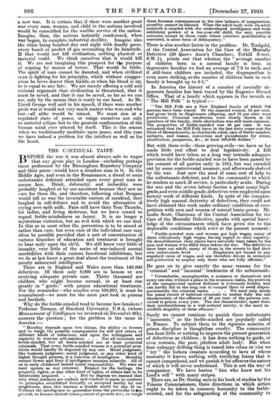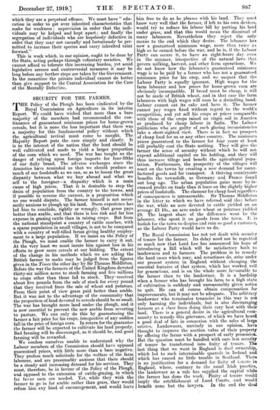THE CONTINUAL TAINT. B EFORE the war it was almost always
safe to wager that any given play in London—excluding perhaps those performed by the Birmingham Repertory Company and their peers—would have a drunken man in it. In the Middle Ages, and even in the Renaissance, a dwarf or some unfortunate deficient attended upon every great man to amuse him. Drink, deformity, and imbecility were probably laughed at by our ancestors because they saw no cure for these ills, and therefore, following what Bergson would tell us was the invariable custom of mankind, they laughed in sell-defence and to avoid the alternative of crying over spilt milk. Fairs still have their Tom Thumbs, fat ladies, and living skeletons, but we have ceased to regard feeble-mindedness as funny. It is no longer a mysterious visitation, but an evil with which we can deal. In this as in most other ills, prevention is to be aimed at rather than cure, but even cure of the individual case may often be possible provided that a sort of concentration of various branches of education and treatment is brought to bear early upon the chid. We still know very little of insanity, very little of the series of war-induced mental morbidities with their curious functional inhibitions, but we do at last know a great deal about the treatment of the merely subnormal intelligence. There are in England and Wales more than 149,000 defectives. Of these only 8,000 are in homes or are receiving adequate private care. Thirty thousand are children who might become normal, or at least rise greatly in " grade," with proper educational treatment. For the remainder—who number over 100,009, it must be remembered—we must for the most part look in prisons and brothels.
Why do the feeble-minded tend to become law-breakers ? Professor Terman, of Stanford University, U.S.A. (whose Measurement of Intelligence we reviewed on Deceml er 6th), answers the question ; for the problem is the same in America :- "Morality depends upon two things, the ability to foresee and to weigh the possible consequences for self and others of different kinds of behaviour, and upon the willingness and capacity. to exercise self-restraint. . . . Not all criminals are feeble-minded, but all feeble-minded are at least potential criminals. That every feeble-minded woman is a potential pros- titute would hardly be disputed by any one. Moral judgment, like business judgment, social judgment, or any other kind of higher thought process, is a function of intelligence. Morality cannot flower and fruit if intelligence remains infantile. All of us in early childhood lacked moral responsibility. We were as rank egoists as any criminal. Respect for the feelings, the property rights, or any other kind of rights, of others had to be labonously acquired. . . • But by degrees we learned that only when instincts are curbed, and conduct is made to conform to principles established formally er accepted tacitly by our neighbours, does this become a livable world for any of us. Without the intelligence to generalize from the particular to the general, to foresee distant consequences of present acts, to weigh
these foreseen consequences in the nice balance of imagination, morality cannot be learned. When the adult body with its adult instincts is coupled with the undeveloped intelligence and weak inhibitory powers of a ten-year-old child, the only possible outcome, except in those cases where constant guardianship is exercised, is some form of delinquency."
There is also another factor in the problem. Dr. Tredgold, of the Central Association for the Care of the Mentally Defective (30 Queea Anne's Chambers, Tothill Sireet, S.W. 1), points out that whereas the " average number of children born in a normal family is four, in degenerate families we find an average of 7'3 to each, and if still-born children are included, the disproportion is even more striking, as the number of children born in each family is brought up to 84."
In America the history of a number of mentally de- generate families has been traced by the Eugenics Record Office. That of a family which appears in the records as " The Hill Folk " is typical :— " The Hill Folk are a New England family of which 709 persons have been traced. Of the married women, 24 per cent. had given birth to illegitimate offspring, and 10 per cent. were prostitutes. Criminal tendencies were clearly shown in 24 members of the family, while alco holism was still more common. The proportion of feeble-minded was 48 per cent. It was estimated that the Hill Folk have in the last sixty years cost the State of Massachusetts, in charitable relief, care of feeble-minded, epileptic, and insane, conviction and punishment for crime, prostitution, pauperism, &c., at least 500,000 dollars."
But with these evils—these growing evils—we have so far made little real effort to deal legislatively. A Bill which would have taken us a long way towards adequate provision for the feeble-minded was to have been passed by the consent of all parties early in 1914, but was crowded out by some controversial measure, and afterwards shelved by the war. Just now the need of some sort of help to the unfortunate deficient, and to the community to which he renders so much ill service, is particularly acute. During the war and the severe labour famine a great many high- grade,and even middle-grade, defectives were employed upon factory work of different kinds. In spite of the compara- tively high manual dexterity of defectives, they could not have obtained this work under ordinary conditions of com- petition with men and women of normal brain-power. Mr. Leslie Scott, Chairman of the Central Association for the Care of the Mentally Defective, speaks with special know- ledge of the circumstances which have given rise to the deplorable conditions which exist at the present moment :
" Feeble-minded men and women got high wages, many of them ridiculously high wages, having regard to their capacity. On demobilization their places have naturally been taken by the men and women who filled them before the war. The defectives have been cut adrift, many of them in the streets to find their own unfortunate level. . . . . Employers are bound to pay standard rates of wages, and are therefore driven in economic self-protection to employ only those who are fully efficient."
He goes on to give exactly the same reasons for the " criminal " and "immoral" tendencies of the subnormals:
" Unteachable, unemployable, a nuisance to themselves and every one else, without a place in the economic realm, the position of the unsupervised mental deficient is extremely forlorn, and can hardly fail in the long run to compel them to swell dispro- portionately the criminal ranks. . . . We need only study the penal record of habitual criminals to realize fully the one characteristic of the offences of 90 per cent. of the persons con- victed to prison every year. The one characteristic, apart from their intolerableness in a well-ordered society, is the most in- credible stupidity of these offences."
Surely we cannot continue to punish these unfortunate " innocents," as the feeble-minded are popularly called in France. To subject them to the rigorous miseries of prison discipline is thoughtless cruelty. The community has done little or nothing to improve the present generation of defectives as children ; it has done nothing to guide, or even restrain, the poor, pilotless adult body. But when that unhappy drifting thing is tossed into crime or vice we " try " the forlorn creature according to laws of whose necessity it knows nothing, with terrifying forms that it cannot comprehend, and we punish it for offences the nature of which it will never understand. This is not the way of compassion. We have beaten " him who knew not his 'Lord's will " with many stripes. There are, as Dr. Goring says in his book of studies by the Prisons Commissioners, three directions in which action ought to be taken in common humanity to the feeble- minded, and for the safeguarding of the community to which they are a perpetual offence. We must have " edu- cation in order to get over inherited characteristics that make for weakness : supervision in order that the indi- viduals may be helped and kept apart ; and finally the segregation of individuals who are hopelessly defective in order that they may not casually and fortuitously be per- mitted to increase their species and carry inherited taint forward."
This is work which, in our opinion, ought to be done by the State, acting perhaps through voluntary societies. We cannot afford to tolerate this increasing burden, yet amid legislative arrears and controversial measures it may be long before any further steps are taken by the Government. In the meantime the private individual cannot do better than give support to the Central Association for the Care of the Mentally Defective.



























 Previous page
Previous page